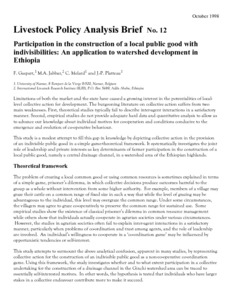Resource information
Limitations of both the market and the state have caused a growing interest in the potentialities of local-level collective action for development. The burgeoning literature on collective action suffers from two main weaknesses. First, theoretical studies typically fail to describe inter-agent interactions in a satisfactory manner. Second, empirical studies do not provide adequate hard data and quantitative analysis to allow us to advance our knowledge about individual motives for co-operation and conditions conductive to the emergence and evolution of co-operative behaviour. This study is a modest attempt to fill this gap in knowledge by depicting collective action in the provision of an indivisible public good in a simple game-theoretical framework. It systematically investigates the joint role of leadership and private interests as key determinants of farmer participation in the construction of a local public good, namely a central drainage channel, in a watershed area of the Ethiopian highlands.



